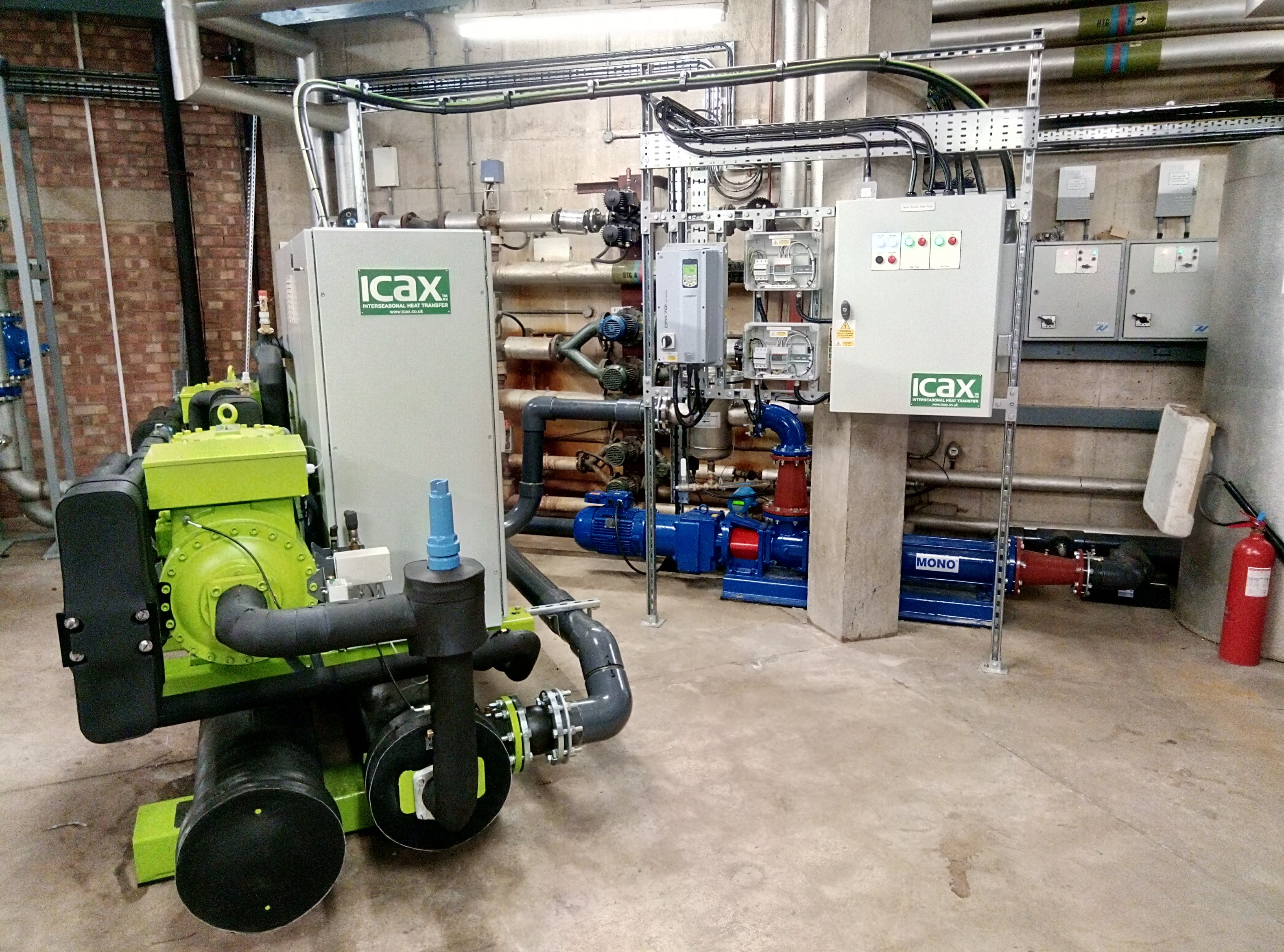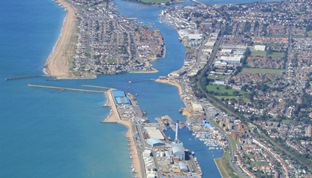Shoreham Harbour Marine Source Heat Pump
An ICAX marine source heat pump has being installed in Maritime House at the east end of Shoreham Harbour to provide heating in place of the oil boilers which were previously heating the building.
ICAX designed an abstraction and rejection system to cope with the corrosive potential of salt water and biological growth and potential fouling from molluscs and other maritime debris.
The ICAX heat pump is designed to provide a high temperature flow to the building so that the existing heat distribution system within Maritime House did not need to be refurbished. This saved time and avoided disruption so that the retrofit proceeded with minimum interruption to the work that goes on in the building.

This 300 kW heat pump, like all other heat pumps, will emit no carbon dioxide on site. Because heat pumps avoid the need for combustion it also issues no nitrogen dioxide, nor sulphur dioxide or any other gas or particulate matter in Shoreham.
Heat pumps use electricity which may be generated from renewable electricity or from fossil fuel sources. The CO2 released at power stations is sometimes attributed to use of electricity for heating to imply that use of heat pumps is not entirely low carbon heating. However, the electricity generated for the National Grid has a dramatically reduced carbon factor now that coal fired generation is largely phased out and wind generated electricity is making an increased contribution.
The electricity supplied to the heat pump in Shoreham Harbour will take advantage of the Virtual Power Plant being established in the Shoreham to reduce the cost and carbon content of the electricity used by using Demand Side Management algorithms to match the use of electricity to times of excess supply where this can be achieved without compromising the heating or cooling requirements in the building.
Carbon emissions saving
By displacing the oil-fired heating with sustainable, electrically driven heat energy, the heating system will save around 1,400 tonnes of CO2 over the next 20 years. If the Shoreham Port Authority source their electricity from a zero carbon supplier, this would rise to over 1,600 tonnes of CO2 saved.

The Electrification of Heat
The electrification of heat opens up opportunities not only to balance the national grid, but also to use demand side response techniques at the local level to balance local energy supply and demand.
The heart of the network is the efficient use of renewable energy based on the recycling of solar heat in the sea (transferred from the Caribbean by the Gulf Stream) to heat buildings on the network in winter.
Heat pumps are used to transfer heat to buildings in winter instead of generating heat afresh when needed by burning fossil fuels. ICAX has developed heat pumps which can deliver high temperatures so that they can be used at the heart of a Fourth Generation Heat Network to deliver heat to buildings on the network. ICAX is also researching the feasibility of using a Fifth Generation Heat Network in Shoreham.
Balancing the supply and demand for heat through the seasons is mirrored by balancing the supply and demand for electric power by shifting some of the demand from times of peak consumption (by day) to times of excess supply (by night).
Electrification of Transport
Vehicles can be free from emitting CO2 and NO2 if propulsion is based on an electric drive train. Battery electric vehicles need time to charge and electric charge points which will be installed in Shoreham. Fuel cell electric vehicles can be charged quickly at hydrogen charging points, which will also be installed at Shoreham and Horsham.
The Energy Trilemma
The SmartHubs Project is accepting the challenge from government and Innovate UK to resolve the Energy Policy Trilemma:
- by using heat networks,
- by using heat transfer instead of combustion,
- by accelerating the electrification of heat
- by accelerating the electrification of transport
- and by employing "demand response" to focus on using off-peak electricity and reduce peak electric demand.
Demand Response
Demand side response can be used to shift the timing of electric demand from hours of peak demand to times of surplus supply. DSR requires a bi-directional energy grid to signal when prices are low to trigger additional use (and to signal when prices are high to inhibit use).
Urban Air Quality
ICAX is also addressing the growing problem of air pollution: the marine source heat pumps and air source heat pumps will provide heating without employing combustion or releasing any gasses on site.
See Ground Source Heating See Ground Source Cooling See Ground Source Energy


